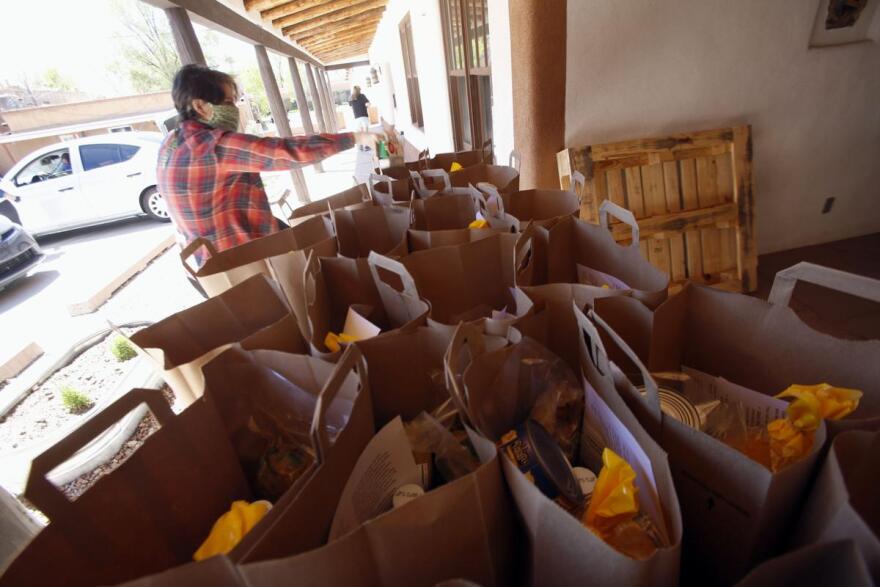Food insecurity has been a persistent struggle that COVID-19 only worsened and shined a light on. Now, the pandemic seems to be in the rearview mirror for many, but the issues of hunger are still persisting for many New Mexicans.
In New Mexico alone, one in seven adults struggle with hunger while one in three children are facing food insecurity.
“It’s difficult when we look at hunger as a problem that needs solving in and of itself. Because hunger doesn’t get solved unless poverty does. Hunger is a symptom of poverty.”
That’s Jill Dixon, Director of Development of The Food Depot here in Santa Fe. She says they normally work with nonprofits to distribute about 6.5 million pounds of food per year. But, due to COVID, they had to do it themselves. In just this past year alone they had an 84% increase in distribution. That’s around 11.4 million pounds of food.
“Because what we saw was the demand for food support doubled in less than two weeks. And what that indicators to me, is an incredible financial vulnerability,” Dixon said. “People couldn’t handle losing one or two weeks of income without needing to rely on the hunger relief network.”
This issue could get worse because of a recent announcement by the federal government that a 15% increase in SNAP benefits could be ending in September because of economic reopening’s across the country. But, Dixon said she's hopeful that people’s incomes will stabilize, however the decrease could cause a ripple effect in demand.
“We saw an absolute correlation when pandemic EBT was added, the extended SNAP benefits, when those kicked in we saw a drop in the number of people who needed assistance.” Said Dixon.
Dixon says that hunger relief isn’t as simple as this. It’s complicated... and only a beginning step to bridge the gap.
However, New Mexico is notorious for food insecurity compounded by many other issues.
UNM PhD economics student Katie Gutierrez says that factors like vulnerable populations facing systemic racism, the immense amount of rural area, a varied and unreliable job industry, and an administrative burden to even apply for assistance make it unlikely New Mexicans will be able to afford their food.
“So, New Mexico has historically had very high rates of unemployment. This is partly because we have a lot of low wage jobs, we have then very few jobs in the middle, then we have higher wage jobs, you know, Sandia or Los Alamos,” Gutierrez said. “And it’s hard for people to move from this low-income category up to a higher income.”
The question then seems to be, will New Mexico’s economy rebound in time?
It doesn’t seem likely, as Gutierrez points to the state's history of being slow to recover from economic crises. And, as of now, 1 in 5 New Mexico residents are currently receiving SNAP benefits.
“Unless we have continued state support and federal support, we can probably expect sort of the same pattern with this. And so, I would say that, the SNAP benefits should be extended because they protect the most vulnerable,” Gutierrez said. “And we can sort of see it as an investment in ourselves. Because of course people say, extending SNAP costs money and yes it does. But allowing people to go hungry also costs and it also hurts people.”
Food insecurity is a growing crisis, but in children it’s especially worse, with 28% of children not knowing where their next meal will come from.
James Jimenez, the Executive Director for New Mexico Voices for Children says that while it’s early for the federal government to cut those extra SNAP benefits, SNAP was never intended to fully fund the food needs of a family. Rather, we should be looking at poverty as the core of the problem many New Mexicans face and there’s a need to build a more inclusive economy.
“We have not figured out a way to build an economy that brings everyone along. Too often we have focused our economic development efforts, like job creation efforts, at levels that, I would say, don’t really address some of the fundamental needs of building a strong vibrant workforce," said Jimenez.
It’s no doubt COVID-19 has only intensified the problems New Mexico is facing. But after this pandemic, Jimenez believes a solution would involve investing in a tax system that will sustain the programs we need... Like early childhood education, funding for school summer meal programs, and making earned income tax credit programs permanent.
“I think it’s really necessary to have sort of a aspirational leadership. Thinking about what we might be, not just about what we were, but holding onto those essential elements of our identity, yes,” Jimenez said. “But also building back better in an aspirational way that says, ‘we can, and should, and will do more’, by investing in families in ways that is going to move us away from ranking 49th overall in child well-being and it does provide a platform for building back better from the pandemic.”
***
Resources:
Senior and Disabled Adults Food Access Hotline: 1-800-432-2080


